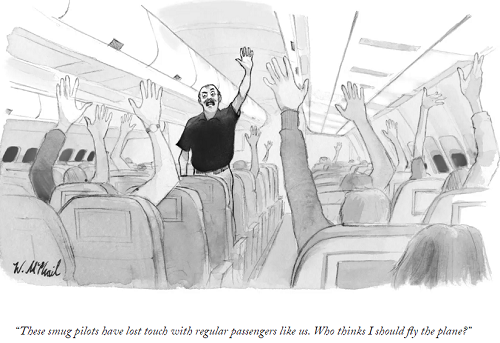Oliver Traldi considers the role of experts in the modern world:
A few weeks before Donald Trump’s inauguration as President, the New Yorker published a cartoon depicting a mustached, mostly bald man, hand raised high, mouth open in a sort of improbable rhombus, tongue flapping wildly within, saying: “These smug pilots have lost touch with regular passengers like us. Who thinks I should fly the plane?” The tableau surely elicited many a self-satisfied chuckle from readers disgusted by the populist energy and establishment distrust that they perceived in Trump’s supporters.
But what exactly is the joke here? Citizens in a democracy are not akin to airline passengers, buckled quietly into their seats and powerless to affect change, their destinations and very lives placed in the hands of professionals guarded by a reinforced door up front. Even brief reflection reveals the cartoonist’s analogy to be comparing like to unlike.
That none of us thinks we know better than a plane’s captain, yet we often think we know better than experts in matters of politics, suggests differences between those domains. And it highlights a vexing problem for modern political discourse and deliberation: We need and value expertise, yet we have no foolproof means for qualifying it. To the contrary, our public square tends to amplify precisely those least worthy of our trust. How should we decide who counts an expert, what topics their expertise properly addresses, and which claims deserve deference?
* * *
We all rely upon experts. When something hurts, we consult a doctor, unless it’s a toothache, in which case we go to a dentist. We trust plumbers, electricians, and roofers to build and repair our homes, and we prefer that our lawyers and accountants be properly accredited. Some people attain expertise through training, others through experience or talent. I defer to someone who’s lived in a city to tell me what to do when I visit, and to a colleague who’s studied a particular topic at length even though we have the same mastery of our field overall. A friend with good fashion sense is an invaluable aid in times of sartorial crisis.
In all these cases, our reliance on expertise means suspending our own judgment and placing our trust in another — that is, giving deference. But we defer in different ways and for different reasons. The pilot we choose not to vote out of the cockpit has skill, what philosophers sometimes call “knowledge how”. We need the pilot to do something for us, but if all goes well we need not alter our own beliefs or behaviors on his say so. At the other extreme, a history teacher might do nothing but express claims, the philosopher’s “knowledge that”, which students are meant to adopt as their own beliefs. Within the medical profession, performing surgery is knowledge-how while diagnosing a headache and recommending two aspirin as the treatment is closer to knowledge-that.
But how are those without expertise to determine who has it? Generally, we leave that determination to each individual. A free society and the free market allow for widely differing judgments about who to trust about what, with credentialing mechanisms in place to facilitate signaling and legal consequences for outright fraud. Speculative bubbles notwithstanding, the market also helps to aggregate countless individual judgments in ways that yield socially valuable outcomes. Two New York City diners may have signs promising the “World’s Best Cup of Coffee”, but the one that actually has good coffee is more likely to be bustling on any given day and to thrive in the long run.
H/T to Ed West’s weekly round-up post for the link.




